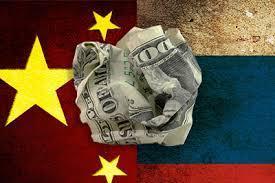April 26, 2024
By Sharan Kaur Phillora
In a bold economic shift, Russia and China have nearly phased out the use of the US dollar in their bilateral trade dealings, signaling a significant move towards de-dollarization. Russian Foreign Minister Sergey Lavrov recently highlighted that over 90% of the transactions between the two nations are now conducted in their national currencies, the yuan and the ruble.
Here’s what we know:
This transition away from the dollar aligns with the broader BRICS strategy to diminish Western economic dominance, particularly in the Global South. Lavrov, speaking with Russia’s TASS news agency, expressed satisfaction over this achievement, noting that it fosters stronger economic ties between Russia and China.
Amid escalating Western sanctions due to geopolitical tensions, this strategy offers Moscow and Beijing a way to sidestep restrictions that have impacted Russia’s ability to conduct business globally. Trade between the two countries has surged, growing by 26% since 2022 to reach $240 billion this year, with China emerging as the leading importer of Russian oil.
In addition to de-dollarization, Russia is actively developing alternative trade routes in Asia to bypass sanctions. This includes investing billions in establishing new transport corridors linking Russia with Kyrgyzstan via the Caspian Sea and extending from Belarus to Pakistan. These initiatives build on previous plans like the North-South Corridor, intended to connect Russia to the Indian Ocean through Iran.
Sergei Ivanov, Russia’s presidential envoy for environmental issues, confirmed the strategic importance of these corridors, emphasizing that they provide unrestricted access to critical regions like the Persian Gulf, irrespective of Western sanctions.
Furthermore, Russia and Iran have connected their banking systems to facilitate transactions without Western interference, showcasing their resilience against ongoing sanctions.
However, experts like Markus Jaeger from the Atlantic Council warn that such maneuvers do not guarantee immunity from Western economic pressures. U.S. and European sanctions, especially those intensified after Russia’s 2022 invasion of Ukraine, continue to challenge Moscow’s economic activities.
As global dynamics shift, the repercussions of Russia and China’s economic strategies are closely watched, with potential implications for international trade and political relations, particularly concerning U.S. and China tensions.
About the author
Sharan Kaur Phillora’s thirst for knowledge has led her to study many different subjects, including NFTs and Blockchain technology – two emerging technologies that will change how we interact with each other in the future. When she isn’t exploring a new idea or concept, she enjoys reading literary masterpieces.



